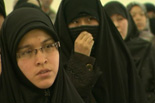Afghan cleric defends marital law
Religious leader hits out at critics who say new legislation legalises marital rape.

Its critics say the law is a throwback to the deposed Taliban regime, which fell in 2001 after the US invaded Afghanistan.
The Taliban required women to wear all-covering burqas and banned them from leaving home without a male relative.
International outcry
Mohseni, one of the law’s main drafters, said the legislation could not be revoked or changed because it was enacted through a legislative process – passed by both houses of parliament and signed by the president.
| IN VIDEO | ||
|
| ||
| Afghan cleric rejects marital law criticism | ||
| More Videos… |
Dozens of Afghan legislators and officials have also condemned the law, which was passed in March.
Barack Obama, the US president, called it “abhorrent” and Navi Pillay, the United Nations human rights chief in Afghanistan, called for the Afghan government to revoke the legislation, saying it was “reminiscent of the decrees made by the Taliban regime”.
Hamid Karzai, the Afghan president who earlier signed the law, has put it under review.
Speaking in Kabul, Mohseni dismissed Western concerns.
“Westerners claim that they have brought democracy to Afghanistan. What does democracy mean? It means government by the people for the people. They should let the people use these democratic rights,” he said.
The legislation came out of three years of debate and revision involving both Islamic scholars and members of parliament, he said.
Shia law
Surrounded by supporters, Mohseni unfurled reams of paper with hundreds of women’s signatures and thumbprints backing the law.
Though the law only applies to the country’s Shia population – just 10 to 20 per cent of Afghanistan’s 30 million people – Mohseni, the country’s top Shia cleric, said most of the articles could also be applied to Sunnis.
Mawlawi Habibullah Ahsam, a prominent Sunni cleric, said the rules about women submitting to sex and leaving the home would also be acceptable to Sunnis.
Afghanistan is an Islamic state and its constitution defers to the Quran as the ultimate authority. Mohseni said the law simply reiterates rules from Islam’s holy book.
“In shariah, it states that a woman cannot go out without the permission of her husband,” he said.
He argued that the law is permissive because it allows a woman to go out for a medical emergency or other urgent reason without asking.
He also said much of the uproar had come from people misinterpreting the law and that a woman could refuse sex with her husband for many reasons beyond illness, including fasting for Ramadan, preparing for a pilgrimage, menstruating, or recovering from giving birth.
